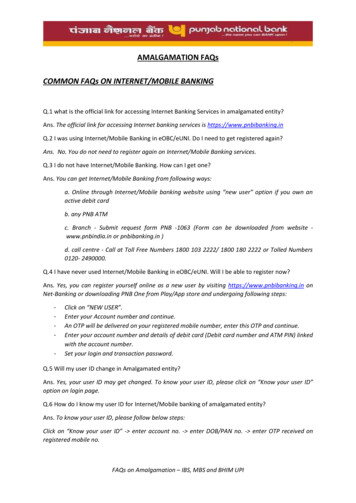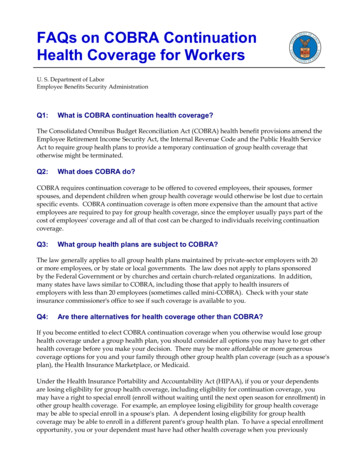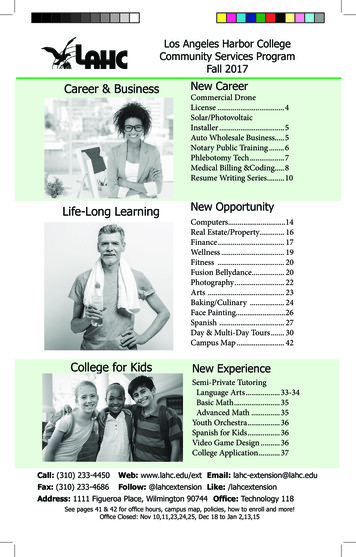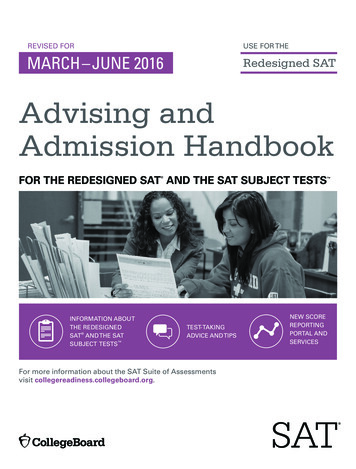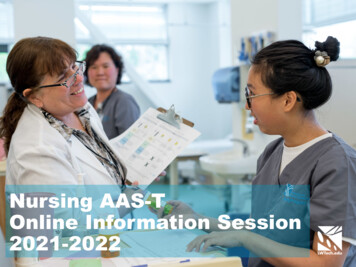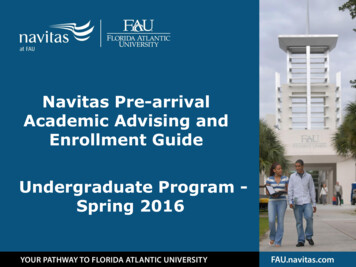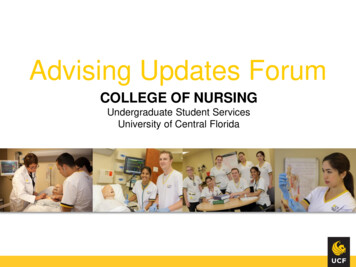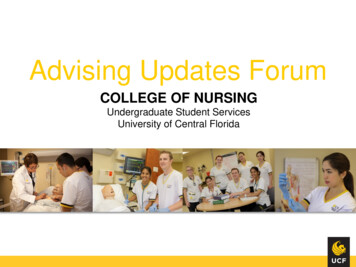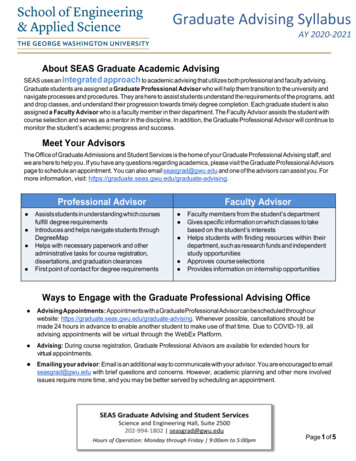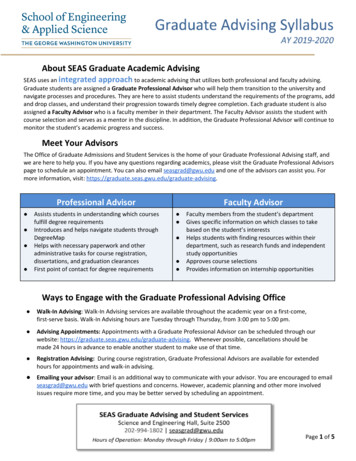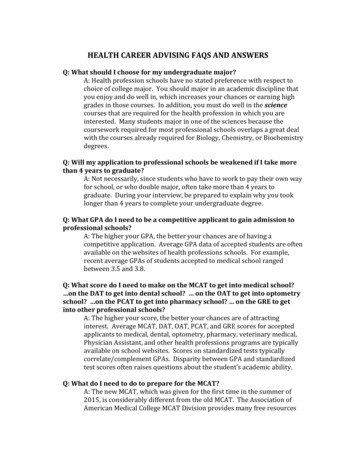
Transcription
HEALTH CAREER ADVISING FAQS AND ANSWERSQ: What should I choose for my undergraduate major?A: Health profession schools have no stated preference with respect tochoice of college major. You should major in an academic discipline thatyou enjoy and do well in, which increases your chances or earning highgrades in those courses. In addition, you must do well in the sciencecourses that are required for the health profession in which you areinterested. Many students major in one of the sciences because thecoursework required for most professional schools overlaps a great dealwith the courses already required for Biology, Chemistry, or Biochemistrydegrees.Q: Will my application to professional schools be weakened if I take morethan 4 years to graduate?A: Not necessarily, since students who have to work to pay their own wayfor school, or who double major, often take more than 4 years tograduate. During your interview, be prepared to explain why you tooklonger than 4 years to complete your undergraduate degree.Q: What GPA do I need to be a competitive applicant to gain admission toprofessional schools?A: The higher your GPA, the better your chances are of having acompetitive application. Average GPA data of accepted students are oftenavailable on the websites of health professions schools. For example,recent average GPAs of students accepted to medical school rangedbetween 3.5 and 3.8.Q: What score do I need to make on the MCAT to get into medical school? on the DAT to get into dental school? on the OAT to get into optometryschool? on the PCAT to get into pharmacy school? on the GRE to getinto other professional schools?A: The higher your score, the better your chances are of attractinginterest. Average MCAT, DAT, OAT, PCAT, and GRE scores for acceptedapplicants to medical, dental, optometry, pharmacy, veterinary medical,Physician Assistant, and other health professions programs are typicallyavailable on school websites. Scores on standardized tests typicallycorrelate/complement GPAs. Disparity between GPA and standardizedtest scores often raises questions about the student’s academic ability.Q: What do I need to do to prepare for the MCAT?A: The new MCAT, which was given for the first time in the summer of2015, is considerably different from the old MCAT. The Association ofAmerican Medical College MCAT Division provides many free resources
to help students prepare for the new test. These include guides tocontent, test preparation, and practice test materials. It is suggested thatstudents planning to take the MCAT will want to take courses inBiochemistry, Psychology, and Sociology to prepare for questions fromthose areas of knowledge, in addition to the premedical requirements.See the following for /mcat/Q: How much and what sort of volunteer work should I do?A: Medical schools are looking for applicants who have exhibited depth ofcommitment (passion) for service to others. Volunteerism could behealth-related, although it does not have to be. Volunteering for Hospice,Habitat for Humanity, Planned Parenthood, and Reading Connections aresome examples of volunteer agencies where UNCG students have servedin the past. Dental schools like for students to volunteer with theMissions of Mercy (MOM) dental clinics. Professional schools are notlooking for dabblers; that is people who jump from one type of volunteerwork to another; rather they are looking for applicants who havechallenged themselves to gain meaningful experiences. Both UNCG’sOffice of Service Learning and Leadership and Career Services Centerhave resources to help you find volunteer experiences.Q: How can I get more hands-on patient care experience?A: Hands-on patient care experiences are typically only available tostudents who have training and have obtained some sort of certificationor credential to prove that they are trained. For example, students whohave Emergency Medical Technician (EMT) training/certification or areCertified Nursing Assistants/Aides (CNAs) can often obtain positions inhospitals, nursing homes, home health agencies, and free clinics wherethey can get substantive patient care experience. Medical scribe trainingthrough local companies is accepted by some institutions as “hands-on”,while others consider this “watching” with an extra piece. Hands-onpatient experience is extremely valuable (and for PA schools, REQUIRED)for an impressive application and interview experience.Q: Should I do research in a faculty member’s laboratory?A: Research is not required for admission to medical, dental, or veterinarymedical school, but statistics on admitted students confirm that it ishighly desirable. If you are interested in a career in academic medicine,dentistry, or veterinary medicine, then it is very important that you doresearch. Health professions schools will be interested in what kind ofresearch you did, but, more importantly, they will be interested in whatyou learned about yourself through your research experience. Doing aresearch project with a faculty member has the added benefit of possiblystrengthening a letter of recommendation.
Q: Which upper level science courses should I take?A: Upper level courses in biochemistry, cell biology, genetics, physiology,microbiology, neurobiology, immunology and histology are some of thecourses taken by students who apply to medical, dental, and veterinarymedical schools. They are often recommended, but are not necessarilyrequired for admission. You should check the Admission Requirementssection on the websites for the health professions schools that you areinterested in for any specific science course requirements.Q: What conditions make it worthwhile for me to repeat a required courseto try to make a better grade?A: Consider retaking prerequisite courses that you got “C” grades in, orlower, to show academic improvement. (See Financial Aid questionsbelow: Normally Financial Aid does NOT cover repeated courses, so youwould have to take at least 12 hours of “new” classes in any semesterwhere you are repeating a course, or you’ll have to pay for that course outof pocket.) As an alternative to repeating lower level courses, gettingexcellent grades in upper level courses is another way to demonstrateacademic success.Q: Who should I ask to write letters of recommendation/evaluation?A: Since UNCG does not use a committee for writing letters, you will needto ask individual faculty members to write letters for you. You want toget to know your professors so they will be able to write strong lettersabout you both as a student and as person. You do not want testimonialletters. Most health professions schools will specify the number andsources of reference letters. You will want letters from people who cancomment effectively about your capabilities and your character. Youshould use the AAMC letter writer’s guidelines to decide who can addressthe particular attributes that medical schools consider important.Q: Should I take a Kaplan course or some other MCAT prep course?A: The decision on whether to take a test prep course is up to YOU. Testpreparation courses, such as those for the MCAT, DAT, GRE, and PCAT areexpensive. Students who are eligible for need based financial aid mayqualify for a fee reduction. There are many available test preparationresources that you can purchase that are less expensive than taking a testpreparation course, which can be found on the AAMC website. If youwish to purchase test prep materials, a discounted Kaplan MCAT prepcourse is now available for UNCG students in the spring of each year.Q: Who should I talk with who can help me with Plan B if my initial goalschange or do not seem realistic?A: The best person to talk with you about your goals and aspirations isyour Pre-professional advisor (listed second on your DegreeWorksadvisor box). You can also speak to the Chair of the Health Careers
Advisory Committee (Robin Maxwell) and consult the Career ServicesCenter in Elliott University Center to discuss alternative careers.Q: Is it required that my academic advisor be specially designated as ahealth careers advisor?A: No, but it can be helpful as you navigate your college career to beadvised by someone with appropriate training and experiences. Atrained health careers advisor can provide you with information andopportunities related to your desired path, since they have helped otherstudents successfully navigate the process.Q: I’m a post baccalaureate student; should I finish a second degree?A: It typically takes two years for post-bac students to gain admission totheir health professions schools. Some post baccalaureate students havefinished second degrees in Biology, Chemistry or Biochemistry by takingrequired classes for those majors during a second full year of postbaccalaureate study (the gap year when they are applying to medical orother health professions school). Most post baccalaureate students donot complete a second degree, but many take additional courses duringthe gap year. Taking more than the minimum number of courses oftenstrengthens applications. Post baccalaureate students should persist withhands-on health care experiences and/or health-related volunteeractivities during the gap year while they are applying to schools.Q: What is a gap year? Should I take advantage of a gap year?A: A gap year (sometimes referred to as a “glide” year or “growth” year) is ayear between finishing your bachelor’s degree and entering the professionalprogram of your choice. One of the most attractive things about a gap year isthat it allows you to spread your science classes out throughout your entiretime in college, rather than compressing them all into the first three years.(Basically, if you want to begin your professional program in the fallfollowing graduation, with no gap, you have to have all of your requiredscience classes completed by the end of your JUNIOR year, in order to takethe entrance exam and apply in the fall of your SENIOR year of college.) Witha gap year, you can study for that MCAT/DAT/OAT/PCAT/GRE, get morehands-on or volunteer experience, perfect your personal statement, andpotentially do research or take additional post-bac classes to beef up yourscience GPA. Only about one-third of all students applying to medical schoolslast year did so straight from college without a gap year, and the averagestarting age for health-related professional schools is 25 years.Q: What is a good way to stay informed about health-related programs atUNCG?A: If you are listed as a pre-professional student (second major), then youshould automatically be a part of the Canvas organization “PreProfessional Programs” group, which has announcements of upcoming
events and opportunities, as well as modules with information aboutsummer enrichment, letters of recommendation, interview strategies, andresources for each pre-professional track. Not an official pre-professionalsecond major? Be sure to declare that second major using the Changeyour Major function in UNCGenie’s Student records. Then, send yourUNCG email address to Robin Maxwell (Robin Maxwell@uncg.edu) andshe will add you to the organization.Information about health-related career events is often posted on theBiology Department html).A Health Careers bulletin board with useful information for all preprofessional students (and specific information about different tracks) ismaintained on the lab hallway of 1st floor Sullivan Building. You shouldmake a habit of checking this frequently when you are in the building.To Prepare a Strong Professional School Application:Q: How can I write an outstanding personal statement?A: Attend the Personal Statement Writing Workshop that is usually heldin the spring semester. Also, you should consider starting an e-portfolio.You should title the e-portfolio “The Why I Want to be a Doctor (Dentist,Veterinarian, PT, PA, etc.) portfolio”. Use your portfolio to document yourthoughts, ideas, and, even more importantly, experiences that you havethat show that you know why you want to be doctor or some other healthprofessional. The portfolio will help you write your personal statementabout why you want to be a doctor. It should also have some greatpersonal stories/anecdotes that show your commitment to your futurecareer. Once you have written your personal statement, make sure thatyou get plenty of feedback/criticism about it from a variety of individualsthat you feel write well. You should also take it to the Writing Center forevaluation of your grammar, flow, and tense agreement.Q: How can I prepare strong secondary/supplemental applications?A: Secondary/supplemental applications will have more questions aboutyou and your motivations for a particular health career. Your answersneed to be carefully thought out and well written. Be sure to getfeedback/criticism of your secondary application before you send it. Besure not to “copy and paste” information from your personal statementinto the secondary application questions!Q: How can I get help preparing for professional school interviews?A: The Career Services Center does mock interviews. Go to the CareerServices and ask to schedule a mock interview for medical (or otherhealth professions school). Also, check with your health careers advisor
to see if they would do a mock interview with you. Before any interviewat a medical or other health professions school, be sure to review yourprimary and secondary applications. What you have written aboutyourself in those applications often forms the basis for an interviewer’squestions. Develop and practice your “elevator speech.”Q: Where can I find out specific information about the schools to which Iam interested in applying?A: You should explore the websites of the schools that you are interestedin to see what their requirements are as well as any other informationthat they may post. To organize and compare this information, werecommend that you create a chart or checklist of these requirementsand recommendations. Include average GPA and average test scores foracceptance into each program, as well as important dates and deadlines,in addition to pre-requisite coursework. You might also find it helpful toconsult with a health career advisor about the schools in which you areinterested.Q: How many students does UNCG get into medical/dental/veterinarymedical school every year?A: This is not an appropriate question to ask, since UNCG does not get anystudents into medical/dental/veterinary medical school. UNCG students getthemselves into those schools by virtue of their academic performance, theirperformance on a high stakes national test, their letters of recommendation,the quality of their applications, and, most importantly, through theirexperiences that demonstrate to medical/dental/veterinary schools (andother health professions) that they know why they want to be doctors,dentists, veterinarians, etc. UNCG students enjoy the same, or slightly higher,average acceptance rate to professional schools as other, comparableinstitutions or programs.Financial Aid QuestionsQ: Can I receive financial aid for repeating a course to improve mygrade?A: If you previously failed a course, you may be eligible to receive financialaid for the repeated course. If you have already passed the course (even atanother school and you have transferred the credit(s) to UNCG), you are noteligible to receive financial aid for repeating the course. Repeated courses doNOT count toward the Overall Earned Credit Hours if no credit is awardedthe semester the course is repeated. Repeated courses DO count towardsattempted hours, and will be considered in Science GPA calculations byprofessional schools.
Financial aid will not be disbursed on repeat coursework once a course hasbeen passed unless a course is deemed repeatable for credit by theUniversity.Please see the University Registrar's policy on Grading in the UndergraduateBulletin.Q: I am interested in taking a (Dance, Spanish, Anthropology, etc.)course while completing the post-baccalaureate program inBiology. Am I eligible for financial aid?A: No, you are only eligible to receive financial aid for courses required tocomplete the degree you declared when you entered the post-baccalaureateprogram. Please review your DegreeWorks evaluation to see what therequired coursework would be. More details specific to the post-bac programcan be found at this c pre-med.htmlQ: What is the Satisfactory Academic Progress (SAP) policy for financialaid recipients?A: All students who wish to qualify for financial aid at UNCG will be assessedon certain criteria as required by both the federal and stategovernments. These criteria include minimum grade point average,minimum semester credit hour completion rate, cumulative completion rate,and completion of a degree within a maximum time frame. A student whomeets the standards of the SAP policy for Financial Aid is considered eligiblefor financial aid. A student must also meet other financial aid requirements inorder to receive financial aid.Please review the SAP policy under the important forms section of theFinancial Aid website for additional information:
some examples of volunteer agencies where UNCG students have served in the past. Dental schools like for students to volunteer with the . Certified Nursing Assistants/Aides (CNAs) can often obtain positions in hospitals, nursing homes, home health agencies, and free clinics where . You
